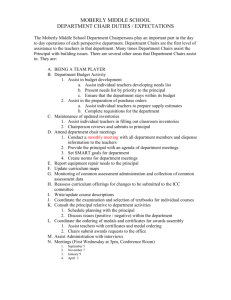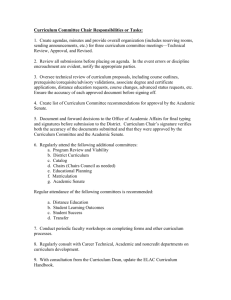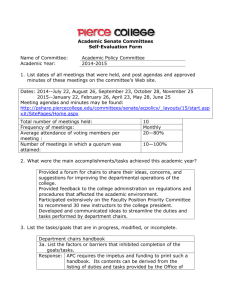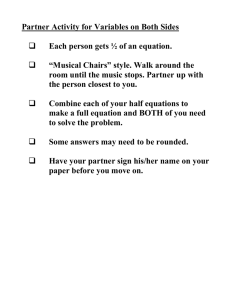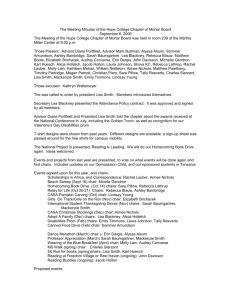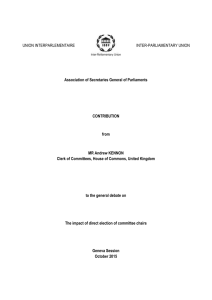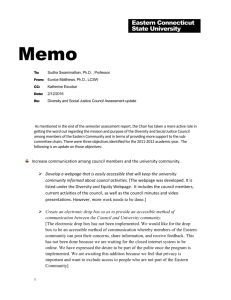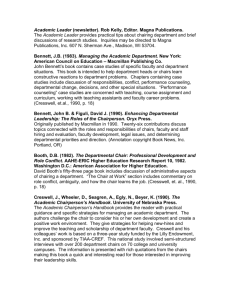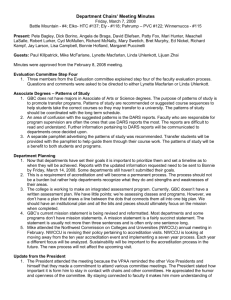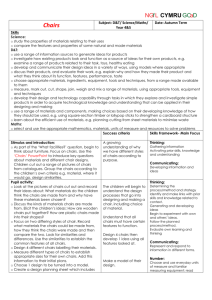Reporting - University Health Care System
advertisement
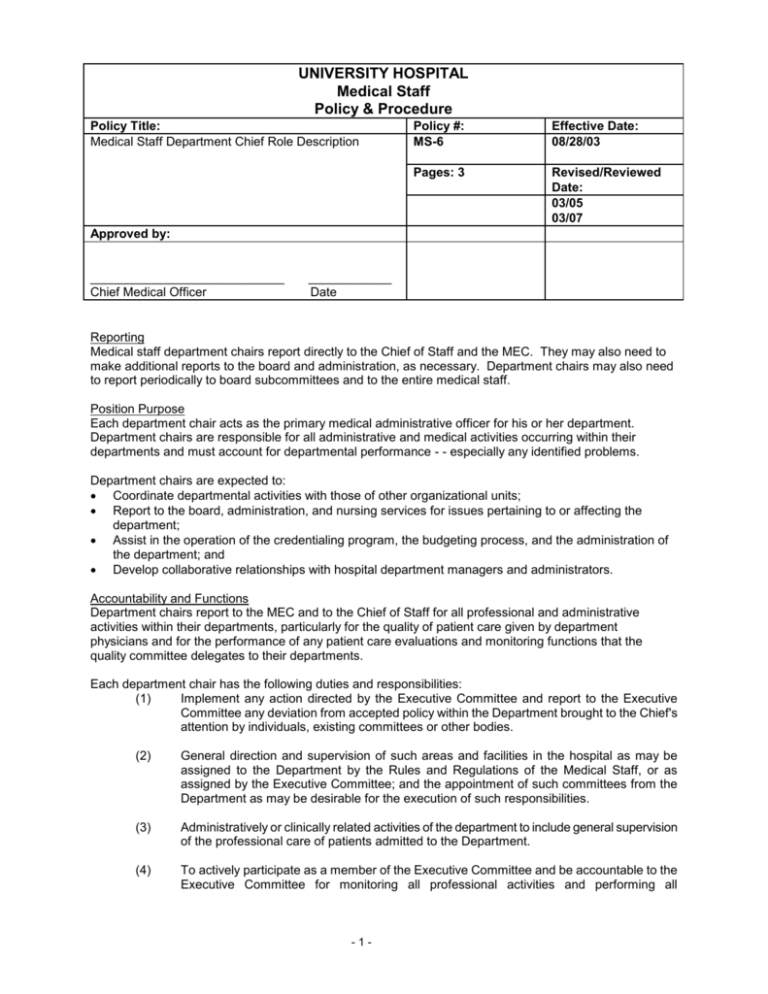
UNIVERSITY HOSPITAL Medical Staff Policy & Procedure Policy Title: Medical Staff Department Chief Role Description Policy #: MS-6 Effective Date: 08/28/03 Pages: 3 Revised/Reviewed Date: 03/05 03/07 Approved by: ____________________________ Chief Medical Officer ____________ Date Reporting Medical staff department chairs report directly to the Chief of Staff and the MEC. They may also need to make additional reports to the board and administration, as necessary. Department chairs may also need to report periodically to board subcommittees and to the entire medical staff. Position Purpose Each department chair acts as the primary medical administrative officer for his or her department. Department chairs are responsible for all administrative and medical activities occurring within their departments and must account for departmental performance - - especially any identified problems. Department chairs are expected to: Coordinate departmental activities with those of other organizational units; Report to the board, administration, and nursing services for issues pertaining to or affecting the department; Assist in the operation of the credentialing program, the budgeting process, and the administration of the department; and Develop collaborative relationships with hospital department managers and administrators. Accountability and Functions Department chairs report to the MEC and to the Chief of Staff for all professional and administrative activities within their departments, particularly for the quality of patient care given by department physicians and for the performance of any patient care evaluations and monitoring functions that the quality committee delegates to their departments. Each department chair has the following duties and responsibilities: (1) Implement any action directed by the Executive Committee and report to the Executive Committee any deviation from accepted policy within the Department brought to the Chief's attention by individuals, existing committees or other bodies. (2) General direction and supervision of such areas and facilities in the hospital as may be assigned to the Department by the Rules and Regulations of the Medical Staff, or as assigned by the Executive Committee; and the appointment of such committees from the Department as may be desirable for the execution of such responsibilities. (3) Administratively or clinically related activities of the department to include general supervision of the professional care of patients admitted to the Department. (4) To actively participate as a member of the Executive Committee and be accountable to the Executive Committee for monitoring all professional activities and performing all -1- administrative duties within the Department, and particularly for monitoring the quality of patient care rendered by members of the Department and to effectively conduct the patient care audit and other quality review, evaluation, and monitoring functions delegated to the Department. (5) Develop and implement departmental programs for patient care audit and other quality, evaluation, and monitoring functions delegated to the Department and keep the President of the Medical Staff informed as to the status of these programs. (6) Maintain continuing review of the professional performance of all practitioners with clinical privileges as well as other practitioners assigned to the Department and report regularly thereon to the Executive Committee. (7) Transmit to the appropriate authorities, as required, the Department's recommendations concerning appointment and classification, reappointment, delineation of clinical privileges or specified services, and corrective action with respect to practitioners in the Department. (8) Recommend to the medical staff the criteria for clinical privileges that are relevant to the care provided in the department. (9) Integrate the department or service into the primary functions of the organization. (10) Coordinate and integrate interdepartmental and intradepartmental services. (11) Develop and implement policies and procedures that guide and support the provision of care, treatment and services. (12) Recommend sufficient number of qualified and competent persons to provide care, treatment and service. (13) Determine the qualifications and competence of department or service personnel who are not licensed independent practitioners and who provide patient care, treatment and services. (14) Continuously assess and improve the quality of care, treatment and services. (15) Maintain quality control programs, as appropriate. (16) Orient and continuously educate all persons in the department or service. (17) Recommend space and other resources needed by the department or service. (18) Appoint such subcommittees as are necessary to conduct the functions of the Department and designate a chairman and secretary of such subcommittees. (18) Enforce the Hospital and Medical Staff Bylaws, policies, and Rules and Regulations within the Department, including initiating corrective action, investigating clinical performance, and ordering consultations to be provided when necessary. (20) Assess and recommend to the Governing Body off-site sources for needed patient care, treatment, and services not provided by the department or the organization. (21) Perform such other duties commensurate with the position of Department Chief as may periodically be reasonably requested of the Chief by the Executive Committee. Position Requirements To be eligible to serve as Department Chief, an individual must have used University Hospital for the majority of the individual’s admissions for the previous year and be certified by an appropriate specialty board or affirmatively established comparable competence through the credentialing process. Comparable -2- competence is defined as at least five years of active staff membership with evaluation under the medical staff quality assessment process demonstrating quality patient care. The department chair may not, at any point during his or her term, be an officer or leader in any other medical staff organization. Recognition and Benefits Medical staff department chairs are encouraged to participate in one external continuing education event per year that pertains to medical administrative activities. Due to the significant time commitment this position demands and the possibility for significant family and practice disruption, the organization will periodically invite and reimburse expenses to department chairs for participation in a continuing education program. Serving as department chair automatically fulfills all other medical administrative requirements, as outlined in the bylaws, such as service on other committees, and payment of dues. The department chair is also entitled to use the services of the medical staff office for correspondence and research needs pertaining to departmental operations. Occupational Hazards Department chairs face potential legal involvement in matters pertaining to corporate negligence and antitrust. In response to such risk the institution provides protection to individuals holding this position through indemnification clauses in bylaws and hospital policies, procedures and insurance coverage, provided those actions related directly to the performance of the functions described in this position description or other documents are not criminal in nature and are executed in good faith. The time commitment this position demands is quite significant and may preclude development of personal practice plans. Sometimes, department chairs must participate in controversial or difficult issues that may result in a decreased number of referrals. Approvals: Credentials Committee: 3/12/07 MEC: 3/20/07 Board of Trustees: 3/22/07 -3-
